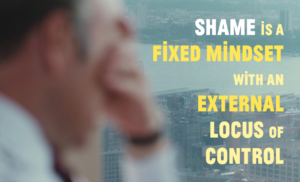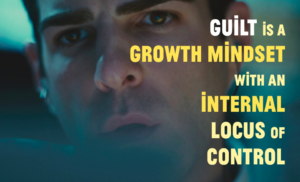Start the Shame Series from the beginning: here
Looking back, my adolescence (all 35 years of it), was kind of like The Truman Show. I was living under an invisible, manmade bubble of dogma founded on a bedrock of shame. But something always seemed off. It was in the background noise of my nagging anxiety. It was the incongruity of my chronic discontent and sophomoric existential angst despite leading a privileged, white, middle-class existence. But after my so-called shame breakthrough, it all started to make sense. I could suddenly see flashes of life beyond the bubble, as if walking out of Plato’s cave for the first time. I started to notice all kinds of “facts” about life that were actually just beliefs, and unfounded beliefs at that. I was appalled to realize that most of my core values were nothing more than opinions I had arbitrarily inherited from other people, who in turn had arbitrarily inherited them from other people as well, and so on. These were tenuous, dogmatic beliefs handed down from generation to generation, reinforced by a deep fear of the shame we all might feel if we contravened any of them. It’s a highly effective system of self-perpetuating social control, an innate behavioural regulator.
So how far back does this game of broken shame-o-phone go? To the Garden of Eden perhaps? The fact is we must have shame for a reason. It’s a very powerful vestigial instinct that we presumably evolved over millions of years because it helped our ancestors survive back in hunter-gatherer times (when all of our best instincts were formed). Tim Urban, author of the delightful Wait But Why blog, has already done a great job of explaining this idea in his post “Taming the Mammoth: Why You Should Stop Caring What Other People Think”, so I’m just going to quote him here:
“Back then [in hunter-gatherer times], being part of a tribe was critical to survival. A tribe meant food and protection in a time when neither was easy to come by. So for your Great2,000 Grandfather, almost nothing in the world was more important than being accepted by his fellow tribe members, especially those in positions of authority. Fitting in with those around him and pleasing those above him meant he could stay in the tribe, and about the worst nightmare he could imagine would be people in the tribe starting to whisper about how annoying or unproductive or weird he was—because if enough people disapproved of him, his ranking within the tribe would drop, and if it got really bad, he’d be kicked out altogether and left for dead. …
Because of this, humans evolved an over-the-top obsession with what others thought of them — a craving for social approval and admiration, and a paralyzing fear of being disliked.”
Urban doesn’t explicitly say this, but that “paralyzing fear” is, of course, the fear of shame. And what this really means is that in a way, deep down inside, we all subconsciously equate social rejection with death. And what’s more, we are all primed with a very literal microcosm of what he’s describing during our introductory class on life, or as it’s normally called, “childhood”. This is a time when our very survival really does depend on the love, support, and care of our “tribe”. In this period of development our cult leaders, or “parents”, literally just tell us what is “good” and what is “bad” and we have to believe them. In fact, many parents actively exploit shame to enforce obedience. Historian Peter N. Stearns notes in his book Shame: A Brief History:
“There is every reason to believe that parental practices that expose children to an apparent threat of denial of affection, as part of discipline in such areas as toilet training, form a vital precondition to uses and experiences of shame later in life, and in larger social contexts.”
So in many ways, shame can be seen as an endless form of childhood. A stage that we should grow out of once we become adults who can reason for themselves. But we so often don’t. Moreover, we are no longer hunting and/or gathering at all. Our instincts simply have not caught up with the incredible advancements of our civilization. We now have built-in protective mechanisms, like medicine, welfare, social security, healthcare, foster care, counseling, vitamin water, etc, so shame no longer serves a useful purpose in keeping humans alive.
Let me say that again, because I think it bears repeating. Shame no longer serves its main evolutionary purpose: keeping us alive. But with varying degrees of intensity, we all still have this innate instinct to try to fit in and gain approval from other people, what shame expert Brené Brown calls “hustling for worthiness”. Some people (like me) have a generalized and exhausting form of it, trying to win approval from everyone. Some people are trapped in the endless childhood of seeking the approval of their parents or family. Some people have transferred this approval to a new authority like a political affiliation, a religion, a culture, a profession, or Oprah. Some people channel it into a social “scene” or tribe. Others look for this approval from their romantic partners. Most of us have a mix of several of these, all tangled together. Growing up gay, I developed a pretty bad case of wanting pretty much everyone to like and approve of me at all times, for fear that I would otherwise be rejected just because of my sexuality (in fact, anyone who grew up with any kind of secret is that much more susceptible because hiding the truth plays right into shame’s logic of perception over reality).
Of course, there’s nothing wrong with wanting people to like you. We are innately social creatures. We need and desire connections with other people, perhaps no longer for survival, but certainly in order to thrive and be happy. So shame is inexorably intertwined with what is actually a very healthy need, sort of like an old and senselessly ferocious guard dog chained to the gates of social rejection. In this way it may appear that shame encourages healthy socialization, using delightful slogans like, “Don’t be an ass or you might die sad and alone!” But shame could just as easily trap you in a horribly unhealthy toxic relationship with the very same logic.
Shame doesn’t intelligently discriminate who it wants you to gain approval from. If, for example, you are gay, or trans, or left-handed, or redheaded and you happen to be born into a family of bigots, shame will try to convince you that you need to hate yourself, hide yourself, and attempt to change yourself in order to “fit in” with your shitty family. And that may have been necessary for your very survival thousands of years ago (or maybe you could have just become a shaman or something). But in this day and age, where you can connect with like-minded people on the internet or escape to the big city and build a “chosen family”, risking rejection in order to lead a life of honesty and authenticity is without a doubt the better, healthier alternative to living a lie. So no, shame is not beneficial for healthy socialization.
But what about in cases of criminal behaviour? What about pedophilia? Or murder? Or internet trolls? Doesn’t shame help steer us away from these morally reprehensible behaviours? To answer this, let’s delve quickly into Dr. Carol Dweck’s fascinating research on the psychology of “mindset”. Dweck studied youth and education and found that among students from unstable backgrounds who would statistically be expected to underperform in school, there was a small minority who would in fact overperform. In studying these miraculous After-School-Special-worthy students, she discovered that they all shared a unique trait, a way of looking at themselves in the world that the other students did not. She calls it a “growth mindset”. These were kids who basically just genuinely believed that they had the ability to change and grow and improve. The other students had what Dweck calls a “fixed mindset”, believing that their talents and abilities were basically innate and fixed.
The fixed mindset is essentially just believing, as I did, that you’re either good at math or bad at math, and that’s that. Whereas kids with a growth mindset would think, “Well I may not be good at math yet, but I could be if I just worked really hard at it”. This mindset extends far beyond just math, of course, encompassing any type of self-assessment. Do you view yourself as “good” or “bad”, or do you see yourself as fluid and full of potential to change and evolve? You may even have a fixed mindset in one area and a growth mindset in another.
Once again, you’re probably nodding along thinking, “Yeah yeah, of course, I know this”. But just like shame, this isn’t something that you can just know from hearing it. This is another breakthrough that you have to have about your own mindset. For example, through a lot of self-examination, it has become clear to me that I have a very fixed mindset. And to make matters even worse, I’m a millennial (or Xennial to be exact). I grew up with idealistic baby boomer parents who said I could do anything I wanted. This wasn’t a case of underestimating myself, no. I actually assumed that I must have lots of talent. That I must be a special, gifted unicorn. Mixing that millennial entitlement to talent and specialness with a fixed mindset is a shame disaster waiting to happen and a breeding ground for narcissism because you expect and demand all of the rewards of talent, but with none of the effort. To be fair, I actually put a lot of effort into doing things, it’s just that I put little importance on learning things. My mistakes were never viewed as mistakes. So I was prolific but stubbornly unskilled. I can say from experience that attempting to change a fixed mindset is a very slow and difficult process.
All this to say, shame is the ultimate form of a fixed mindset. Shame is the belief that you literally are your mistakes. That they are a fixed trait about you. One misstep could therefore stain you permanently, “proving” that you are inherently bad and unlovable forever. You had a drunken one-night stand? You must be a slut. Stole a bag of Skittles? Now you’re a criminal. Flunked a test? You’re a failure, and you always were. Dweck discovered in her research that when children failed to correctly answer a math problem that was beyond their skill level, it actually excited the growth mindset kids to learn and improve, while it discouraged the fixed mindset kids into giving up, or even worse, cheating and lying to hide their mistakes, aka their shame (which is perception over reality, yet again).
The same is true for adults, and this is why shame and especially shaming doesn’t help prevent crime. Shame may initially be an effective deterrent against conscious “bad” behaviour. But as soon as someone makes a mistake (as we all inevitably do), shame then backfires completely. It just reinforces a fixed mindset about one’s intrinsic immorality, leaving no hope that you could possibly learn from your mistakes and change, grow, or be rehabilitated. Brené Brown asserts that shame is actually much more likely to cause criminal behaviour than to stop it. Famed violence researcher James Gilligan agrees. In Jon Ronson’s timely book, So You’ve Been Publicly Shamed, Gilligan is quoted as saying that violence is “a person’s attempt to replace shame with self-esteem”. After decades of studying inmates at maximum-security prisons, Gilligan noted:
“Universal among the violent criminals was the fact that they were keeping a secret. A central secret. And that secret was that they felt ashamed — deeply ashamed, chronically ashamed, acutely ashamed. I have yet to see a serious act of violence that was not provoked by the experience of feeling shamed or humiliated, disrespected and ridiculed.”
So, as you can see, shame is not a useful moral guide. However, Brené Brown and others make an important distinction here between shame and guilt. Brown describes the feeling of shame as, “I am a bad person”. Whereas the feeling of guilt is, “I did a bad thing”. Shame is an external assessment of your self, based on the potential judgment of other people. Whereas guilt is an internal assessment of your actions, based on your own judgment and values. As you can probably see, this definition of guilt represents a healthy growth mindset. It’s a useful step away from shame that recognizes you are so much more than just your faults and failures.
This may sound super cheesy, but when I make a mistake I actually find it incredibly helpful just to say out loud, “I did a bad thing, but I am not a bad person”. Thereby shifting the shame I feel into guilt using a growth mindset. This mindset gives me the distance to safely acknowledge the mistake in order to make amends for it and learn from it without being defined by it. In this way, guilt can be extremely motivating in a positive way. In fact, I think making mistakes and going through this growth mindset/guilt process is an essential step in building your integrity and personal values. I firmly believe that we all need to make some big mistakes in order to truly develop our own sense of right and wrong. Because if you haven’t acknowledged and learned from your own mistakes, there’s a very good chance that your “morals” are actually just someone else’s dogmatic hand-me-downs. The most powerful lessons are the ones we learn the hard way.
So we’ve determined that shame doesn’t teach us right from wrong. It doesn’t improve our relationships and it doesn’t even help us stay alive. So what is shame good for? According to Brené Brown, absolutely nothing! There is nothing you should be ashamed of. And certainly nothing you should be shaming other people for.
I’m not going to lie though. If you’re an asshole who just wants to control people in the short term, then shame is one of the most powerful ways to do so. You can easily employ it to keep your children or your employees or your students or even your lovers under your thumb. But to do so is not only cruel and oppressive, it will ultimately backfire, sometimes violently. Shame creates toxic relationships. Which aren’t really relationships at all. They are one-way power trips that dehumanize everyone involved. It’s the exact opposite of the authentic human connection we all crave as social animals. To build healthy relationships, we absolutely need to avoid using shame in our households, schools, businesses, love lives, and society at large. In fact, the righteous shaming we dole out daily on Twitter, in politics, on late-night talk shows, and in the news isn’t actually accomplishing anything. It’s not changing opinions, it’s entrenching them. And it certainly isn’t helping people, it’s destroying them.
But that doesn’t mean we should never feel shame. Shame is still an instinct, after all. Our toxic culture of public shaming is different than the normal feeling of shame that we all naturally experience from time to time. James Gilligan describes it as “…an unavoidable consequence of the fact that we are all imperfect and therefore will all inevitably and appropriately suffer the narcissistic wound of acknowledging our own imperfections”. I suspect that this type of naturally occurring personal shame is more than just the emotional equivalent of male nipples. There may be a healthy side effect to the experience of personal shame, one that cuts to the very core of what it means to be human. Feeling a healthy dose of shame could be a key component in the development and maintenance of positive social emotions, like empathy (I’ll talk more about the important connection between shame and empathy later).
Suffice to say, the goal here is not to rid ourselves of shame completely. Not only is that probably impossible, but we may need some shame after all. What I think we can safely do, however — must do, in fact — is disentangle the natural, instinctual feeling of shame from the dogmatic fear of shame that controls us.
Part 3: Shame vs Equality, here!





